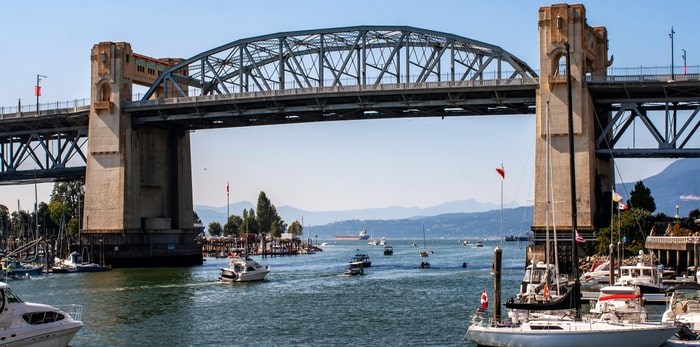A group of environmental activists is planning to try to shut down some of Canada's busiest bridges on Monday by having protesters lie down or sit in traffic lanes.
 Burrard Bridge/Shutterstock
Burrard Bridge/Shutterstock
The Extinction Rebellion group's targets include the Angus L. Macdonald Bridge over Halifax Harbour, the Burrard Street bridge in Â鶹´«Ã½Ó³»and the Prince Edward Viaduct in Toronto.
Patrick Yancey, a Nova Scotia organizer for the event, says the planned acts of civil disobedience are aimed at showing the public that major disruptions are inevitable if society fails to act on climate change.
"The intent is for our key decision-makers to wake up and take some action on the climate crisis," Yancey said in an interview.
In similar protests in the United Kingdom this summer, the group created traffic disruptions in several major cities that lasted for hours or even days.
A spokesman for Halifax police said "public safety" will be the primary focus of the force's response to any protest on Monday, and officers will "enforce federal and provincial statutes where necessary."
Halifax Harbour Bridges, which oversees both the Macdonald and MacKay bridges, said in an email that management wants to respect the right to peaceful protest while upholding the Crown corporation's mandate to ensure "safe cross-harbour passage."
About 40,000 vehicles use the Macdonald bridge daily. Yancey emergency vehicles that urgently need to use the bridge will be allowed to cross, as will the roughly 1,200 people who bike or walk across the bridge daily.
The MacKay bridge will not be targeted, he said.
Asked about whether he's concerned about public backlash against the civil disobedience, Yancey said milder tactics have not moved governments to consider rapid change.
"We've tried everything else, but a major economic disruption is the only thing that's going to get our decision-makers to take action in the climate crisis," he said.
The United Nations Intergovernmental Panel on Climate Change has said there will be irreversible changes to the global environment if society doesn't take rapid, intense action to cut greenhouse gas emissions.
Robert Huish, a professor at Dalhousie University's department of international development studies, said there is a risk for Extinction Rebellion groups that the public will react negatively the group's tactics.
He said he expects a different public reaction from the so-called Climate Strike protests that occurred last Friday, when children participated and some business gave employees the day off to march.
"What can occur is the reaction that comes from (the bridge occupation) is not what the group intended," said Huish.
Huish said that when activists occupied the Golden Gate Bridge 1989 to protest government inaction on the HIV and AIDS crisis, there was widespread negative reaction due to the traffic snarl that ensued.
He said it's possible that while the Extinction Rebellion movement is targeting government, it may draw a stronger reaction from individual citizens who are frustrated.
However, acts of civil disobedience — such as the road occupations and arrests in the U.K. last year — can eventually be remembered as landmark events, he said, while the irritation of individual commuters is forgotten.
This report by The Canadian Press was first published Oct. 3, 2019.
![]()


